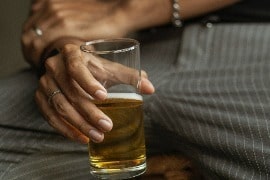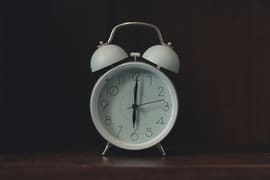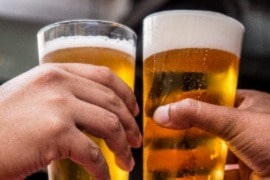Mixing alcohol with Effexor can cause harmful effects and can be dangerous. To be safe, don’t mix these two substances.
Alcohol can interact with many drugs, including antidepressants, and sometimes this mixing can be dangerous. Alcohol is a commonly used substance, and many people with depression and anxiety may use alcohol even when they are taking prescription antidepressant medications like Effexor.
Effexor, the brand name for venlafaxine, is a prescription medication that is commonly used to treat depression, anxiety and panic disorder. It works by allowing the brain chemicals serotonin and norepinephrine to increase, which may alleviate feelings of depression and anxiety. The exact process by which this occurs is complex and not fully understood, however.
Side Effects of Mixing Alcohol & Effexor
Sometimes people use alcohol to help symptoms of depression, and sometimes alcohol use can lead to increased long-term mood symptoms, such as depression or anxiety. It is not always easy to know if depression leads to alcohol use or if it is the other way around. Regardless, it is important to know that using alcohol often makes depression worse in the long run, and is also associated with other health risks. These risks may be elevated by using alcohol with other medications.
Although not many well-controlled studies have been done on specific effects of using alcohol with Effexor, certain adverse effects of either substance may be worsened by mixing them. While occasional alcohol use while taking Effexor may not be dangerous, it is generally not recommended to consume alcohol while taking any antidepressant.
Since many antidepressants, including Effexor, can be associated with side effects that are similar to those of alcohol, these effects can be magnified while taking both substances together.
- Dizziness
- Nervousness
- Reduced inhibition
- Coordination problems
- Confusion
- Short-term memory loss or blackouts
- Delayed reaction times
- Shortened attention span
- Cognitive difficulties
Risk of Internal Bleeding
Effexor, like many other antidepressants, can cause bleeding problems by extending the time it takes for platelets to form normal clots. Alcohol also has a blood thinning effect, so using the two together can result in an increased risk of the following bleeding problems, some of which can be serious or life-threatening.
Internal bleeding issues caused by the mixture of alcohol and Effexor may include stomach bleeding, easy bruising, nosebleeds and bleeding in the brain.
The Effects on Mental Disorders
Along with the potentially harmful effects of mixing alcohol and Effexor, it is important to know that alcohol can worsen the symptoms of depressive disorders and anxiety disorders. A person who mixes these substances may experience worsened anxious and depressive symptoms, including:
- Feelings of sadness and emptiness
- Feelings of anxiety or paranoia
- Mood swings, including increased irritability
- Decreased appetite
Alcohol itself is a depressant drug, and it can counteract the effectiveness of Effexor in treating symptoms of depression and anxiety. It is not clear how much alcohol a person would need to consume to counteract the effects of Effexor since many factors are involved.
Alcohol use essentially cancels out Effexor’s helpful effects, and worsens the symptoms of the mental health condition. Because alcohol use worsens the symptoms of the mental issues that Effexor treats, using alcohol with Effexor is ultimately counterintuitive.
The safest way to avoid worsened psychological symptoms and side effects is only to use Effexor as prescribed and to avoid alcohol use while taking it.
Key Points: If You Mix Alcohol & Effexor
- It is unknown whether it is completely safe to drink alcohol while taking Effexor, so if it is a concern for you or a loved one, it’s important to speak with a pharmacist or doctor
- Mild effects of using Effexor with alcohol may include increased signs of intoxication
- Severe side effects may also be possible with this combination, like bleeding problems or blacking out
- Also if you mix alcohol and Effexor, you shouldn’t drive, operate machinery or put yourself in any other potentially risky situation
- Mixing alcohol and Effexor can make symptoms of depression worse, and can prevent this medicine from effectively treating depression
If you or someone that you know is struggling with alcohol abuse or addiction, The Recovery Village can help. Representatives at The Recovery Village can help you decide what treatment options could be right for you. Call today for more information and to take the first step toward a healthier life.
Articles Related to Alcoholism

Alcohol detox isn’t easy and not everyone can do it on their own. That is why alcohol detox and alcohol withdrawal treatment is administered by medical professionals.

Alcoholism takes many forms, and the stereotype doesn’t always hold true. So when do a few drinks with friends become a full-blown alcohol addiction? How do you know if you are an alcoholic?

While cirrhosis scars from excessive drinking are irreversible, quitting alcohol and leading a healthier lifestyle can help your liver heal from alcohol-related liver disease.

When detoxing, hydration is key. However, certain food groups also have benefits when it comes to helping with the discomfort of withdrawal symptoms and detoxification.

Detox from alcohol can begin within hours. Typically, alcohol withdrawal symptoms happen for heavier drinkers. Alcohol withdrawal can begin within hours of ending a drinking session.

Daily drinking can have serious consequences for a person’s health, both in the short- and long-term. Many of the effects of drinking every day can be reversed through early intervention.


DailyMed. “Effexor XR – venlafaxine hydrochloride (capsule)“>Effexor […]ide (capsule).” December 20, 2018. Accessed May 13, 2019.
National Alliance on Mental Illness. “Can I Drink Alcohol While Taking Antidepressants?“>Can I Dr[…]idepressants?” (n.d.) Accessed May 13, 2019.
Watson, Stephanie. “Does Alcohol Thin Your Blood?“>Does Alc[…]n Your Blood?” Healthline, February 14, 2018. Accessed May 13, 2019.
Crum, RM, et al. “A Prospective Assessment of Reports of Drinking to Self-Medicate Mood Symptoms With the Incidence and Persistence of Alcohol Dependence“>A Prospe[…]ol Dependence.” JAMA Psychiatry, July 2013. Accessed May 13, 2019.
The Recovery Village aims to improve the quality of life for people struggling with substance use or mental health disorder with fact-based content about the nature of behavioral health conditions, treatment options and their related outcomes. We publish material that is researched, cited, edited and reviewed by licensed medical professionals. The information we provide is not intended to be a substitute for professional medical advice, diagnosis or treatment. It should not be used in place of the advice of your physician or other qualified healthcare providers.